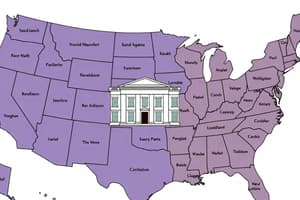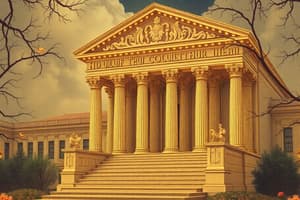Podcast
Questions and Answers
Why did the Framers choose federalism?
Why did the Framers choose federalism?
To prevent government abuses of power.
What is federalism?
What is federalism?
A system of government with a division of power between the national government and state governments.
What does the term federalism refer to?
What does the term federalism refer to?
A government system in which power is divided between the national and the state governments.
What does division of power mean?
What does division of power mean?
The Framers established a federalist system of government to _____.
The Framers established a federalist system of government to _____.
What are the powers of the federal government?
What are the powers of the federal government?
What are delegated powers?
What are delegated powers?
What are implied powers?
What are implied powers?
What are inherent powers?
What are inherent powers?
What powers are denied to the federal government?
What powers are denied to the federal government?
Flashcards are hidden until you start studying
Study Notes
Federalism Overview
- Framers of the Constitution opted for federalism to prevent the concentration of power and potential abuses, a reaction against British governmental authority.
- Federalism involves a division of powers between national and state governments, allowing both to operate with their own agencies and legislative powers.
Definition of Federalism
- Federalism is defined as a government system with power shared between multiple levels, particularly national and state governments.
- The U.S. Constitution outlines this division, giving each level unique powers and responsibilities.
- This approach promotes local action in community matters while enabling national governance on significant issues.
Powers of the Federal Government
- The federal government possesses delegated powers, which are derived from the Constitution and categorized as expressed, implied, and inherent.
- Expressed powers are explicitly detailed in the Constitution, primarily in Article I, Section 8, allowing Congress roles such as taxation, declaring war, and coining money.
- Implied powers are not directly stated but are inferred from expressed powers, supported by the Necessary and Proper Clause in Article I, Section 8, Clause 18.
- Inherent powers arise from the U.S. being a sovereign entity, granting it abilities like regulating immigration and protecting the nation.
Examples of Powers
- Congress uses its expressed power over interstate commerce to enact various implied powers, such as prohibiting racial discrimination and establishing the interstate highway system.
- Inherent powers enable the government to regulate essential functions related to sovereignty, not explicitly mentioned in the Constitution.
Powers Denied to the Federal Government
- Certain powers are expressly denied to the federal government to maintain the balance of federalism, primarily outlined in Article I, Section 9, and the first eight amendments of the Constitution.
Studying That Suits You
Use AI to generate personalized quizzes and flashcards to suit your learning preferences.




